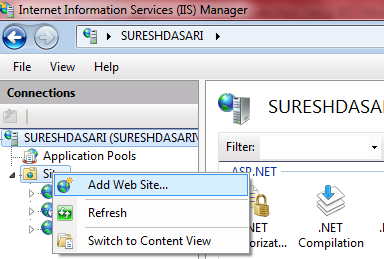Here we will see how to host our asp.net website in iis with custom URL instead of http://localhost/urwebsite.
First, design & develop one sample website in asp.net using visual studio. Once you finish development of your website. Open IIS console by "inetmgr" from RUN and follow below steps:

Add Web Site will open new window, in that we need to enter site name, physical path to website & Host name.

First, design & develop one sample website in asp.net using visual studio. Once you finish development of your website. Open IIS console by "inetmgr" from RUN and follow below steps:

Add Web Site will open new window, in that we need to enter site name, physical path to website & Host name.
After this if we try to open the website from browser we will get error:
Internet explorer cannot display the page.
We are getting this error because of we didn’t set host file with this url
To set url in host file you need to open this path..
C:\Windows\System32\drivers\etc
In this folder select hosts file and open with notepad (if you’re using Windows7 open that file like Run as Administrator) and set the url path will be like this
ipAddress myaspnetwebsite.com
(Note: Don’t include # symbol before IP and url because if you add # it will ignore our site path)
After set the url path now run your application that will show output of your application.
I hope this will help you.
Regards,
Gajanan


Comments
Post a Comment